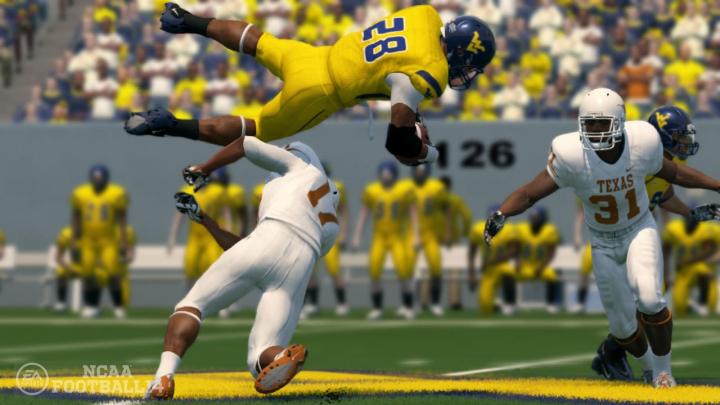
After two decades of producing college football games, Electronic Arts announced that it is canceling its college football series effective immediately. The news comes hours after EA also confirmed that it has settled all lawsuits against it from current and former student-athletes, although terms were not disclosed.
“Today I am sad to announce that we will not be publishing a new college football game next year, and we are evaluating our plan for the future of the franchise,” General Manager of American Football for EA Sports Cam Weber wrote in the post confirming the franchise’s cancellation. “This is as profoundly disappointing to the people who make this game as I expect it will be for the millions who enjoy playing it each year.”
The cancellation isn’t entirely surprising. Both legal and licensing complications began to mount, and EA lost its most powerful partner in the NCAA, the namesake of its college football games.
The NCAA announced in July 2013 that it would no longer license its name or likeness to EA Sports due to the “current business climate and costs of litigation.” EA Sports vowed to continue the franchise without the NCAA’s support and, soon after the split, signed a three-year deal with the Collegiate Licensing Company (or CLC), the group that controls the marketing for over 200 schools, as well as athletic conferences, and the Bowl Games. EA would still require the approval of the individual conferences and schools, however, and that proved to be trickier.
In August, the Big Ten, Pac-12, and SEC all elected to not allow EA Sports to use their names or likenesses, and several other conferences were reported to be mulling their options.

“We have been stuck in the middle of a dispute between the NCAA and student-athletes who seek compensation for playing college football,” Weber wrote. “Just like companies that broadcast college games and those that provide equipment and apparel, we follow rules that are set by the NCAA – but those rules are being challenged by some student-athletes. For our part, we are working to settle the lawsuits with the student-athletes.”
EA, along with the CLC and NCAA, was named as a defendant in a lawsuit started by former UCLA basketball player Ed O’Bannon. O’Bannon and several other current and former student-athletes that later joined the suit claim that the organizations unlawfully made a profit off of their likenesses. Meanwhile, EA, the CLC, and the NCAA claimed that they are protected under the First Amendment. A judge is currently determining if the case can become a class action lawsuit.
Shortly before the announcement that EA Sports would be cancelling its NCAA Football series, EA and the CLC settled all outstanding lawsuits brought against them by current and former players; specific terms were not released. That leaves the NCAA as the sole defendant, and it has vowed to fight the lawsuits all the way to the Supreme Court.
“The ongoing legal issues combined with increased questions surrounding schools and conferences have left us in a difficult position – one that challenges our ability to deliver an authentic sports experience, which is the very foundation of EA Sports games.”
Weber’s statement does leave the door open for the series to return at some point in the future, but after years of messy lawsuits, EA Sports can end the franchise now and walk away clean.
The cancellation marks the end of 20 years of games. EA’s college football franchise first appeared in 1993 as Bill Walsh College Football for the Super Nintendo, Sega Genesis, and Sega CD. It would retain the “Bill Walsh” moniker for one more year before spending two years as “College Football USA.” In 1997 it began using the NCAA license for NCAA Football 98, and it retained that title through this year’s NCAA Football 14.
The timing of the cancellation, as well as the settlement of the lawsuits, comes at an opportune – and possibly not coincidental – time. EA recently named former EA Sports exec Andrew Wilson as its new CEO. While this does mean the end of a popular franchise, it also ends lawsuits that would have cost the company a fortune in legal fees, especially if it ended up going to the Supreme Court as the NCAA vowed.
As for the team of developers dedicated to putting out annual college football games for EA, Weber wrote that EA hopes to find new positions for them.
“We are working to retain the talented people who are part of the team by placing them elsewhere within the EA Sports organization.”


